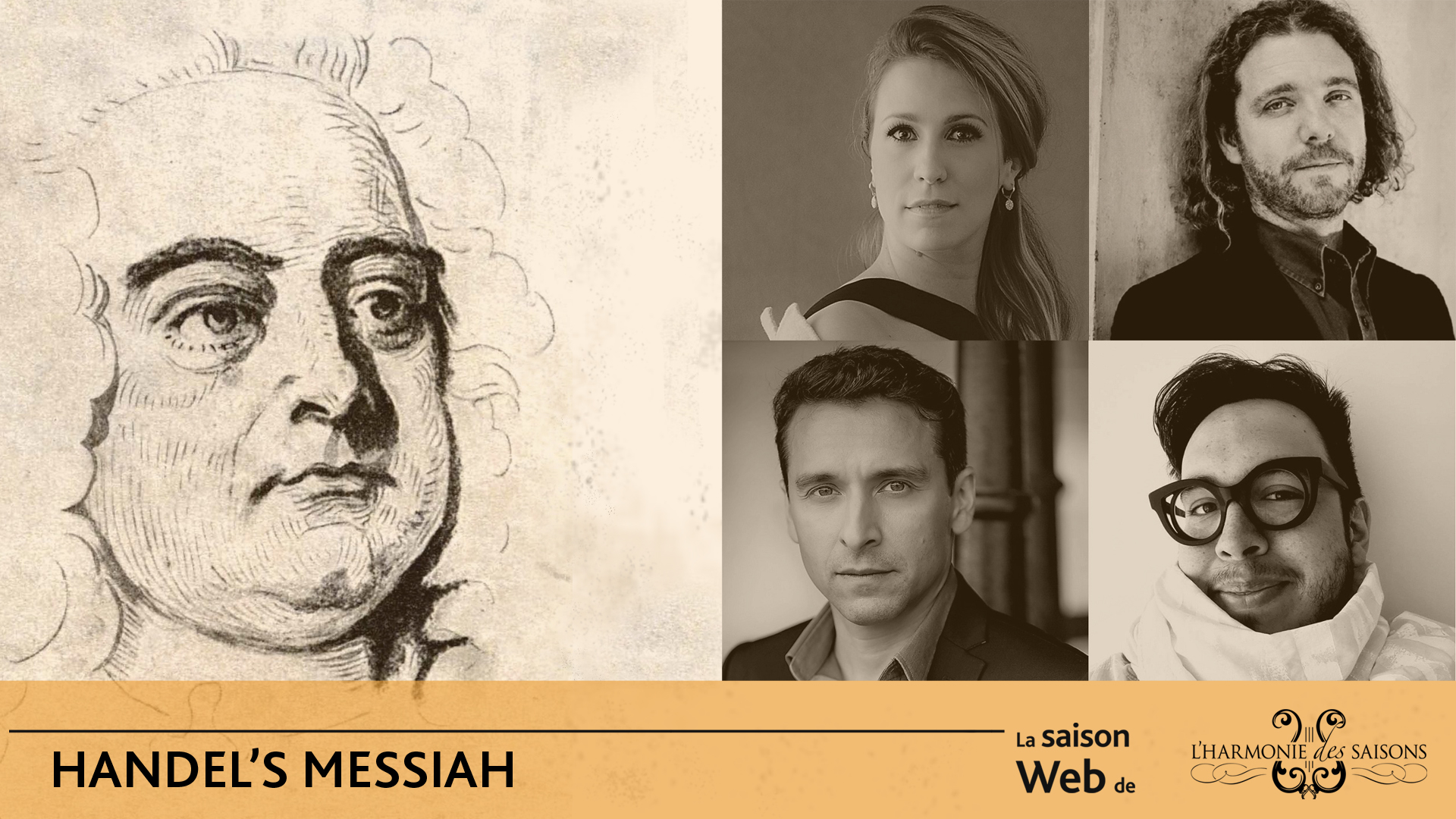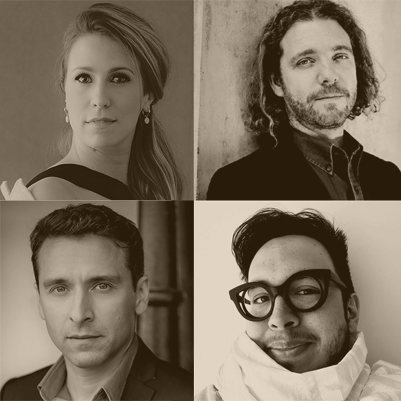HANDEL’S MESSIAH
A Masterpiece for the Holidays
December 13th, 2:00 p.m., at Québec Baroque
Streaming Concert – Available until December 26th, 11:59 p.m.


HANDEL’S MESSIAH
The Masterpiece for the Holidays
Handel, through his signature melodies and fullness of harmony, brings together in his MESSIAH the contemplation of divine mystery, compassion, hope and triumph at its most poignant.
For this performance, L’Harmonie des saisons will present the first part of the Messiah, which recounts the events surrounding the birth of Jesus; and will end with the Hallelujah, replete with its irresistible, exuberant choir, today a universal symbol of joy and gratitude.
Originally conceived for the Easter season, Messiah, the great Oratorio which illuminates musically the prophecy of the coming and resurrection of Christ, is today associated with the feast of Christmas. Handel composed it in twenty-four days at the end of the year 1741, following a severe physical and moral crisis. The work had its premier in April of the following year in Dublin; Handel having retired there to escape the unfolding controversies in London of which he was the subject.
Around this time, the success of Italian opera, to which he had devoted most of his career, had begun to decline. During the 1730’s he began in earnest, with little understanding of the path he was taking, the composition of oratorios in the English language. This form— which he would bring to unprecedented heights— enabled him, through the use of biblical subjects, to speak of human nature in broad terms. Moreover, he would develop the genre by breaking the conventional succession of arias and recitatives— applying his creative prowess to all possible modes of choral writing, exhibiting an unrivaled mastery of the form, combining power and versatility. Up to this point, Handel had never resorted to choral forces in his expansive compositions, since the choir did not feature in Italian operas at the time.
Unlike Handel’s other oratorios, Messiah is presented with neither dramatic action nor characters. As a text, librettist Charles Jennens offered Handel a compilation of excerpts from various parts of the Old and New Testaments, arranged to comment upon the redemption of mankind through the arrival of the Messiah, comprising a three-part meditation on the salvation promised to believers.
Despite a lack of narrative drama, the work is hardly introverted – dramatic, immediate, and highly visual, all of the written details conspire to create deep impact and emotional bonding. The first section relates the promises of Advent and the Nativity: humanity emerges from the darkness and the angel announces the birth of the Child God to the shepherds, inviting them to go to the manger. They are represented musically by a pifa, a type of Sicilian drone whose theme is borrowed from the shepherds of Calabria – piva is the Italian name for the bagpipe. The middle section, which closes with the famous Hallelujah, describes the persistence of darkness in the face of divine intervention and the victory of the risen Christ. The third section- and the shortest— serves as an epilogue: death is overcome by the resurrection and the promise of heaven’s glory.
Handel does not offer us a mystical work: through his signature melodies and fullness of harmony, he brings together the contemplation of divine mystery, compassion, hope and triumph at its most poignant. His emotive impulses serve his convictions— he who readily declared: “I would be very sorry if I only gave pleasure to humanity, I claim to make it better!”
Today, we present the first part (Part the First as Handel called it) of Messiah which recounts the events surrounding the birth of Jesus; and we conclude with the Hallelujah, replete with its irresistible, exuberant choir, today a universal symbol of joy and gratitude.
© François Filiatrault, 2020
Messiah, an Oratorio by George Frideric Handel (1685-1759)
First part
1. Sinfonia
2. Récitatif, ténor Comfort ye, my people
3.Air, ténor Every valley shall be exalted
4.Choeur, And the glory of the Lord
5. Récitatif, basse Thus saith the Lord
6. Air, alto But who may abide
7. Choeur, And he shall purify
8. Récitatif, alto Behold, a virgin shall conceive
9. Air, alto & choeur O thou that tellest good tidings
10. Récitatif, basse For behold, darkness shall cover the earth
11. Air, basse The people that walked in darkness
12. Choeur, For unto us a child is born
13. Pifa (Pastoral Symphony)
14a. Récitatif, soprano There were shepherds abiding in the field
14b. Air, soprano But lo, the angel of the Lord
15. Récitatif, soprano And the angel of the Lord said unto them
16. Récitatif, soprano And suddenly there was with the angel
17. Choeur, Glory to God
18. Air, soprano Rejoice, greatly
19. Récitatif, alto Then shall the eyes of the blind
20. Air, alto & soprano He shall feed His flock
21. Choeur, His yoke is easy and his burden is light
22. Choeur, Halleluia

Recording at Bishop Stewart Memorial Church, Frelighsburg, Québec and at St. George Anglican Church, Granby, Québec (September, October and November 2020
Production : L’Harmonie des saisons
L’Harmonie des saisons
Mélisande Corriveau, artistic director
Eric Milnes, musical director
Soloists:
Hélène Brunet, soprano
Daniel Taylor, alto
Philippe Gagné, tenor
Jonathon Adams, baritone
Choir:
Bronwyn Thies-Thompson, soprano
Rebecca Dowd-Lexk, soprano
Maude Fréchette-Gagné, soprano
Josée Lalonde, alto
Matthew Muggeridge, alto
Maude Côté-Gendron, alto
Kerry Bursey, tenor
Jean-Sébastien Allaire, tenor
Bernard Cayouette, tenor
William Kraushaar, bass
Clayton Kennedy, bass
Léo McKenna, bass
Orchestra:
Julia Wedman, solo violin
Noemy Gagnon-Lafrenais, violin
Marie Nadeau-Tremblay, violin
Guillaume Villeneuve, violin
Laura Andriani, violin
Jessy Dubé, violin
Hélène Plouffe, viola
Margaret Little, viola
Mélisande Corriveau, cello
Felix Deak, cello
Pierre Cartier, double bass
Matthew Jennejohn, oboe
Karim Nasr, oboe
François Viault, bassoon
Christopher Price, trompet
Amir Rabinovitz, trompet
Philip Hornsey, timpany
Eric Milnes, harpsichord
– –
Michel Keable, animation
Mario Proulx, interview
François Filiatrault, texts
Eric Milnes, recording, editing and mixing
Huei Lin, videography
Pascal Piché, videography assistance
Chantal Poulin, management and graphics
Eric Milnes, video montage






